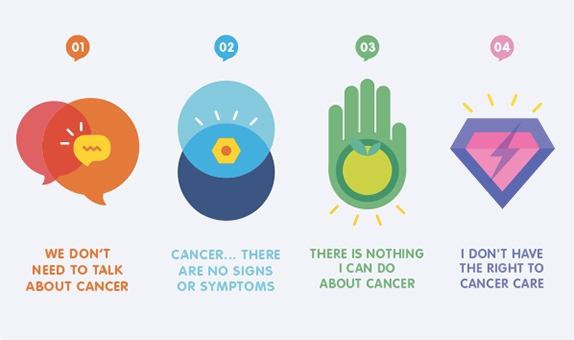February 4th is World Cancer Day and is focused on dispelling the dangerous myths & misconceptions surrounding the disease. It is a chance to raise our collective voices in the name of improving general knowledge around cancer and dismissing misconceptions about the disease. Globally, World Cancer Day is focusing on these four myths:

Let’s talk a bit about myth #2: Cancer…There are no signs or symptoms.
As an oncology nurse, I found this myth a bit troubling. Do people really think there are no signs or symptoms of cancer? But that’s not the whole picture of what this myth is getting at- it is really speaking to early symptoms of cancer, those that occur when the cancer is very small and more easily treatable. And actually, in many early stage cancers, there are no symptoms or they are so vague that they do not cause concern for the individual. In many cases, by the time symptoms become apparent, the disease has grown or spread, making it more difficult to treat. This is why appropriate screening is so important. An early stage breast cancer, cancerous changes in the cervix or a cancerous colon polyp are just a few examples of often-symptomless changes that could be detected by cancer screening with mammography, pap testing and colonoscopy, respectively.
For the majority of cancers, early detection translates to less invasive or toxic treatments and better prognosis. Here in the US, cancer screening is accessible to the majority of individuals, though many choose not to undergo appropriate screenings. This has to change.
Maybe they don’t understand the importance. Maybe they have a misguided belief that they are not at risk. Maybe they think that cancer equals a death sentence and they don’t want to know. Whatever the reason, healthcare professionals and public health organizations have got to do a better job in educating people to dispel these myths that prevent people from accessing cancer screenings. On an individual level, we have to take a bigger responsibility for our own health through healthier living and preventive healthcare. An estimated 30% of cancers could be prevented through not smoking, healthier eating, exercise and living at a healthy weight.
Learn more about the age-appropriate cancer screenings for you. Use this list as a start, but be sure to discuss your family history and risk factors with your healthcare providers to see if other screening is relevant. Learn more about your cancer risk and changes you can make to reduce risk using the What’s My Risk? program on OncoLink.